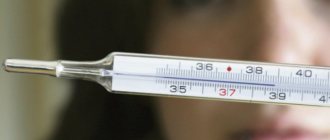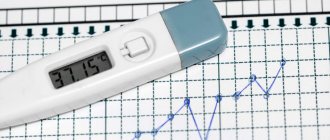Why do illness and critical days coincide?
Sometimes purely external reasons are to blame for the simultaneous occurrence of a viral infection and menstruation. But colds become more active during menstruation due to the fact that a characteristic property of this segment of the cycle is a decrease in immunity. Due to the hormonal changes that accompany menstruation, metabolic processes and the production of protective antibodies slow down when the virus enters the body.
Colds before menstruation have similar causes. The amount of hormones decreases, the body is focused on preparing for the renewal of the reproductive system.
Pain during menstruation
Various pains and abnormalities in the menstrual cycle are a common and understandable phenomenon of PMS. A sharp change in hormonal levels causes stress and decreased immunity in the body. Unpleasant symptoms can be observed individually or in combination, depending on the individuality of the body. There are neuropsychic, edematous, cephalgic and crisis forms of premenstrual pain.
- Neuropsychiatric disorders are accompanied by depression, irritability, apathy and other sudden mood swings.
- The edematous form causes “fulling” and soreness of the chest, swelling of the extremities, intestinal flatulence and exacerbation of the olfactory and taste buds.
- The cephalgic form is characterized by severe headache, pain in the heart, nausea, vomiting, increased sweating and other symptoms. Sore throat, sore throat and increased body temperature above 37 - this can also be attributed to this form of premenstrual pain.
- The crisis form is characterized by the occurrence of sudden crisis attacks in the form of high blood pressure, rapid breathing and heartbeat. In this form, the body is very susceptible to stress and various types of nervous disorders. General fatigue and the presence of infectious diseases increase the impact of crisis attacks on the body.
Why does it hurt a lot under the armpit before menstruation, reasons
In a state of PMS, women complain not only of pain in the pelvic area, general malaise and dizziness.
Many patients note unpleasant discomfort in the armpit area, especially before the onset of menstruation, but do not focus their attention on this.
During a consultation with a gynecologist, some women talk about this symptom only after the doctor’s leading questions.
There are many reasons for this condition. It is possible to understand what is the source of the problem and how serious it is only by conducting an examination, which is recommended by a gynecologist. The problem of painful armpit lymph nodes can be associated with the gynecological sphere, but not only.
Why do I get a cold every time I have my period?
Tell me, who knows, every time before my period starts I get colds, my throat starts to hurt, my nose runs, I feel chilly, and as soon as my period ends, the cold goes away. What is this connected with or is it just a coincidence?
During the onset of your period, your body is at its physical and physiological peak. The body is fully prepared for the hardest work - bearing and giving birth to a baby.
Pregnancy does not occur. Your body decides to “rest” from the stress of mini-childbirth. Taking a break from menstruation, the body stops fighting minor infections (no time for them!). So, instead of pregnancy, you get a slight lack of pregnancy.
Yes, everything seems simple and clear.
After all, during and during the onset of menstruation, a woman’s body is very vulnerable to disease! This is because with the onset of this period the immune system is greatly weakened, since this kind of blood loss is very damaging to health.
In order to somehow take care of yourself, you should be attentive to your body during menstruation: not to get too cold is probably the main thing and eat vitamins.
Internal genitalia before menstruation
The cervix dilates before menstruation, and the amount of mucus gradually decreases. Before menstruation, the cervix becomes denser and drops somewhat. During menstruation, the cervix softens and opens to facilitate the outflow of blood discharge, so it is during this period that the risk of infection increases.
The ovaries enlarge before menstruation and can cause pain. Pain in the ovaries is the result of cyclical changes in the female body. Due to a decrease in the level of estrogen and progesterone production, a small part of the endometrium may peel off and thereby provoke pain. The endometrium before menstruation becomes thinner than in the second half of the cycle. The thickness decreases from 1.5-2.0 to 1.2-1.7 centimeters.
Information
I'm pregnant - all about pregnancy, childbirth and children (0.0015 sec.)
Potentially, at the end of each cycle, the body is ready for implantation of the fertilized egg into the endometrium and further pregnancy. But this is half foreign (genetically) material for a woman. For successful gestation, the immune system reduces its protective functions. Therefore, there is a tendency to exacerbation of chronic diseases and susceptibility to various infectious diseases.
The common cold often means acute respiratory viral diseases, herpetic rashes on the lips, and influenza. They affect menstruation by reducing blood clotting. As a result, changes are possible: heavy discharge, prolonged and spotting, delay (no more than 3-5 days), the appearance of clots, pain.
What to do to avoid getting sick
Every woman should know that the period before menstruation is dangerous in terms of the risk of getting sick. This is especially important if the couple is planning a pregnancy. After all, ARVI at a short term, when there is no delay yet, can affect the progress of pregnancy and lead to a miscarriage, a frozen one. Recommendations for maintaining immunity are as follows:
- do not overcool;
- do not overload the body with mental and physical labor;
- with increased irritability and a tendency to stress, take sedatives and vitamins;
- spend a lot of time outdoors;
- harden the body;
- exercise;
- eat properly and nutritiously, include a large amount of protein foods, fruits and vegetables in your diet.
We recommend reading about how many days a period can be late. From the article you will learn about the normal delay of menstruation depending on age, restoration of the cycle after childbirth, and the reasons for the failure of the cycle.
And here is more information about the anovulatory cycle.
Decreased immunity on the eve of and during menstruation increases the likelihood of getting sick on these days. A cold often does not go away without a trace and affects the menstrual cycle - periods may be more abundant, with clots. Also, often on the eve of critical days there is an exacerbation of chronic diseases. It is important for women to protect their health, not to expose them to excessive stress, to strengthen and temper them.
How to deal with heavy menstruation with herpes
When herpes leads to heavy periods, treatment may be prescribed as follows:
- Duphaston, Utrozhestan, that is, progesterone preparations;
- Naproxen, Indomethacin, Ibuprofen, which relieve inflammation;
- Vikasol, Tranexam, Etamzilat, which stop bleeding;
- Vitamin C, Ascorutin to increase the strength of vascular walls.
To protect capillaries from damage, you can take decoctions and infusions of nettle, knotweed, and peppermint. In addition to the beneficial effect on blood vessels, it is also vitamin therapy, which is necessary during exacerbation of viral manifestations to improve the general condition and relieve intoxication.
Herpes and periods may be more closely related than most women realize. If menstruation is a criterion of gynecological health, then frequent manifestations of the virus are an indicator of general ill-being.
And although it is impossible to completely get rid of it, there is a chance to reduce them to a minimum.
Then you won’t have to worry about the possibility of exacerbation during pregnancy, infection of the child during childbirth, or the occurrence of more severe diseases.
Before using any medications, you should consult a specialist doctor. There are contraindications.
How does menstruation depend on illness?
It is known that many factors can cause a delay and affect the normal course of menstruation. In addition to pregnancy, this could be:
- Stress;
- Ovarian dysfunction;
- Climate change;
- Problems with excess weight;
- Intoxication;
- Bad heredity.
ARVI and menstruation are also interconnected. Cyclic changes are directly related to the release of hormones and changes in the epidermal layer. Once in the body, the virus poisons us with toxins and prevents hormones from being released and replaced by the epidermis in time. Such delays can be associated with both serious flu, a temperature of 39-39.5 degrees, and a common cold.
When to see a doctor
For any cycle disturbances or the occurrence of pathological processes, a consultation with a gynecologist is necessary. If the cycle fails or the duration or intensity of discharge changes due to a cold, it is recommended to get checked and take tests - blood and a smear for microflora.
Typically, a cold lasts 7 days, 3 of which the disease progresses. In this regard, a delay for this period is considered the norm. If you haven’t had your period for 10 days or more, this is a reason to visit a doctor and get tested.
After a cold and treatment with antibiotics, complications are possible:
- disruption of the production of progesterone and estrogen, as a result of which the menstrual cycle is disrupted and the ovulation period is shifted;
- abnormal change in the nature of discharge;
- the appearance of an unpleasant odor;
- purulent discharge;
- painful urination;
- duration of bleeding is more than 7-10 days.
The doctor will definitely refer you for general urine and blood tests and a biochemical blood test. The results will show the general condition of the patient’s body. In case of hormonal imbalance, treatment is prescribed. If menstruation is disrupted due to a weakened body and exposure to bacteria, then a course of general strengthening vitamins is required for rehabilitation and restoration of all vital processes.
When you have a cold, the body becomes stressed, which directly affects the production of hormones. The hypothalamus produces special enzymes that affect the development of the follicle and the process of ovulation. If the egg is not fertilized, your period begins. If there are not enough hormones, a delay occurs. By consulting a doctor, you can find out the exact cause of the cycle disorder.
Colds and periods
The body is a single whole, and it works harmoniously, like a clock, when all organs and systems are in order. It would seem that colds and periods have nothing in common, although in fact this is not the case.
Colds and missed periods are interconnected, since the infectious disease is directly related to the cycle. During infection by bacteria or viruses, the body produces antibodies, the composition of the blood changes, as the fight against pathogenic microorganisms begins.
Quite often, colds and periods appear at the same time. This is due to the fact that before menstruation the body weakens a little and does not fight infection as effectively. Therefore, with the beginning of the cycle, the first symptoms of a cold often appear - cough, runny nose, sore throat, chills, fever, etc. If a cold occurs after menstruation, then a malfunction may occur in the next month due to the fact that ovulation shifts as a result diseases.
Many patients do not know whether there can be a delay with a cold. In addition to the upper respiratory tract, colds can affect the genitourinary system. This often occurs due to hypothermia (sitting in the cold, wet feet). The infection can also lead to inflammation of the appendages or ovaries.
In any case, infection is stress for the body, which results in changes in hormonal levels and disruptions in the functioning of all systems. A slight delay or change in the intensity of discharge is considered normal, but there should be no strange odors, stinging, or severe pain.
The appearance of such symptoms signals the development of infection in the genital tract. During colds, flu, sore throat and other diseases, the immune system becomes weaker and the body's protective functions are reduced, which increases the risk of genitourinary infection.
Runny nose before menstruation
Girls, I recently realized that every month I get a cold associated with the onset of my period (about 8-9 days before day X). I googled it - and indeed, many people note this connection (but this is not described as a classic symptom of PMS in the literature).
Has anyone encountered this problem personally?
Could poor immunity be the cause? Or do you have excellent immunity, but still have a cold before PMS?
I don't know if it makes sense to go to the doctor with this. If someone went, was there any result?
My colds are not associated with my periods, but at some point in my life (at the age of 18-19), on the first day of my period, I always had an allergy - my eyes began to itch terribly, I was constantly sneezing, my nose was running, my throat was terrible. . This state lasted a couple of hours and passed. After some time this stopped. I don’t know what was connected with it.
Yes, a sharp drop in immunity is associated with PMS. It all started after 4 years of taking OK - and still does not stop. Apparently, the immune system has improved greatly (((The gynecologist says that this happens and, like, take care of prevention. So I do it with varying success. If you take Amiksin a week before your period, as a rule, you can do without sick leave.
It seems to me that menstruation generally somehow weakens the body or something like that. If I have a hole in my teeth, then I always have periods = toothache too.
the body is weakened during this period. hmmm, should google it
Yes, a drop in immunity.
I had this for about ten years – it’s like PMS and my throat hurts. Now it has stopped (after I started maintaining the immune system - colds have almost disappeared, including during PMS), but if something tries to “start”, it is usually during this period.
How did you strengthen your immune system, if it’s not a secret? And then exactly the same problems :(
(Everything was chosen by the doctor and everything helped a lot, i.e. I couldn’t even imagine before that I would feel so much better and so much more energetic. But I won’t say the names, because on the one hand you need a doctor, and on the other on both sides – many people consider dietary supplements and homeopathy to be quackery and I’m not ready to argue).
I have a lot of respect for homeopathy. But it should be selected individually, of course, you are right. Can you recommend a doctor if you are in Moscow?
I am in Moscow, and the doctor is in St. Petersburg (but sometimes comes to Moscow). If you are suddenly interested, write in a personal message.
I have crappy immunity, and every time before my period I have a half-cold. Well, 80% of the time. Sometimes I get sick, sometimes I don’t.
and they have already written correctly - the body weakens during the PMS period. so nothing surprising.
Yes, within 8-10 days my temperature rises to 37.1-2, I used to think - well, I’ve caught a cold, but now I just don’t pay attention. your health is also getting worse, but it’s not PMS, i.e. it is clearly observed 2-3 before day X.
I don’t have a cold, but a pain in my spine and neck. and the wisdom teeth, which cannot come out in any way, at this very moment decide to come in after all and the gums become wildly inflamed. It's incredibly annoying!
oh, sister with a neck! I constantly get wild headaches because of this :/
a few days before the CD and in the first 2-3 days of the cycle, immunity weakens. and then it becomes stronger again and is at its peak just during ovulation, which, as usual, occurs in the middle of the cycle. So, it’s not your immune system that is weakened, but this is a common female feature.
By the way (and these are no longer facts, but my personal observation of my own body), taking vitamin C these days increases the chances that there will be no colds.
There’s so much you won’t learn in GO! O.o
I have no connection between colds and PMS. Well, or I never paid attention to it. Although, how can you not notice this? No, I catch a cold quite rarely, certainly not once a month.
Nasal congestion during early pregnancy: signs and treatment
Inflammation of the mucous membrane can be a sign of pregnancy in the early stages. This process can occur for several reasons.
Firstly, during the period of bearing a child, the body of the expectant mother experiences serious hormonal changes, which lead to swelling in the mucous cavity.
Secondly, the gestation period often provokes the formation of mucous discharge without infectious inflammation or an allergic reaction. In medical practice, this process is called rhinitis during pregnancy.
However, the first signs of rhinitis do not always indicate an obligatory pregnancy and girls may not be afraid of an unplanned pregnancy. A runny nose as a sign of pregnancy only appears during a hormonal surge. You can verify your pregnancy using tests or after a special test that can be purchased at a pharmacy.
What causes a runny nose during pregnancy?
The appearance of a runny nose during pregnancy is due to certain physiological processes occurring in the female body.
The fact is that after conception, the expectant mother’s body begins to actively produce certain hormones that have a constricting effect on the mucous membranes localized in the nasopharynx area.
As a result, a woman experiences signs of a runny nose such as mucous nasal discharge, difficulty in nasal breathing, swelling and possible snoring at night.
A pregnant woman may even experience such a characteristic symptom as chills, a painful condition in which the patient feels either hot or cold. This clinical process is also triggered by hormonal imbalance, which manifests itself in the early stages of pregnancy.
Since most medications used for allergic or acute respiratory diseases are strictly contraindicated for expectant mothers, it is important to be able to distinguish a runny nose, which is a manifestation of pregnancy, from influenza or acute respiratory infections, or chronic runny nose, which is often observed in adult patients.
In addition, a runny nose and nasal congestion develop as a result of vasodilation, which is necessary for adequate nutrition of the fetus. Vaporization of blood vessels affects the entire body, including the nasal cavity, which causes the appearance of mucous nasal discharge.
Signs of pregnancy - delayed menstruation and breast swelling
A missed period is the most common and well-known early pregnancy sign that most often prompts women to take a pregnancy test. A missed period can be caused by many reasons, however, if you are sexually active and your period does not start on time, it is better to take a pregnancy test.
Other reasons. Hormonal imbalance, stress, tension, chronic fatigue, excessive weight loss or gain, stopping taking oral contraceptives.
Increased sensitivity and breast swelling are common signs of pregnancy, which make themselves felt 1-2 weeks after conception.
A woman may notice that her breasts react to every slight touch, becoming swollen or painful.
However, there are pregnant women who, on the contrary, in the first weeks of their new condition are surprised by the loss of breast sensitivity.
In addition, darkening of the skin around the nipples may indicate pregnancy.
Other reasons. Premenstrual syndrome, hormonal imbalance, taking birth control pills.
Signs of the disease
What clinical manifestations, accompanied by a runny nose in adults, should alert you and be a reason to consult a specialist?
Colds, flu, infectious and bacterial diseases, accompanied by difficulty breathing and mucous nasal discharge, manifest themselves with the following additional symptoms:
- Headache.
- Increase in body temperature to 38 degrees and above.
- Joint and muscle pain.
- Feverish condition.
- Increased fatigue.
- Cough syndrome.
- Redness of the mucous membranes in the oropharynx area.
Allergies can also trigger the development of a runny nose. Medical experts identify the following signs of allergic rhinitis:
- Copious, clear, mucous nasal discharge.
- Impaired olfactory function.
- Increased tear production.
- The appearance of skin rashes of allergic origin.
- Frequent sneezing.
- Cough syndrome.
- Development of conjunctivitis.
If the above symptoms and clinical signs appear, the patient is strongly recommended to consult a doctor! Diseases of viral, allergic, bacterial or infectious origin require competent and timely treatment, especially when it comes to a pregnant woman!
How to behave correctly if you have cold symptoms?
During sips, a sore throat, heaviness in the temples and some of the usual symptoms that you get used to when you have a cold are not a reason to lower your temperature with pills.
If a pregnant woman feels unwell, even if this condition is questioned, it indicates the need to urgently consult a doctor.
It’s easier to clarify in the office whether it’s pregnancy, early signs, or a common cold, so that you can register or be treated without complications.
Statistics confirm that 70% of women experience colds at the beginning of pregnancy. The process can occur expressed or in the form of unclear symptoms, but the more dangerous the complications are if you do not pay attention. Herpes or “colds” on the lips are also a sign of decreased immunity during pregnancy.
Expert advice:
- A low temperature cannot be “brought down” - this is an indicator of activation of the immune system.
- A runny nose should not be left untreated - it means difficulty breathing and lack of oxygen, which is unacceptable during pregnancy!
- Make wide use of inhalations using eucalyptus tincture, oak bark decoction, sage and coltsfoot. A day, 3-4 five-minute inhalations with herbs under a terry towel are enough.
- If you have a sore throat, be sure to gargle more often with a solution of sea salt, furatsilin and herbal tinctures.
- You should not overuse nasal drops when you have a runny nose - they dry out the mucous membrane. It is better to blockade with Galazolin or Sanorin if necessary - work and studies. Pregnant women are prescribed to take them for no more than 2-3 days. Additional heating in the nose area, the use of salt lamps and aroma lamps with essential oils usually do not harm pregnant women.
- It will also be useful to have raspberry and currant jam, cranberries and lingonberries in the form of fruit drink, rosehip syrup, lemon in sugar and other medicinal delicacies with hot herbal tea.
- Physiotherapy during pregnancy is kept to a minimum; acceptable procedures are prescribed by the doctor.
- Homeopathic medicines can be not only harmless, but also effective only with the guidance of a real homeopathic specialist who understands dosage. There is no overdose of vitamin C, but you should not overuse multivitamins in pharmaceutical packaging, the benefits from them are minimal.
- During pregnancy, you cannot take immunomodulators in “horse” doses; they had to be taken until the new position.
It is advisable to avoid taking pills and mixtures until effective treatment is prescribed by doctors. Do not forget to rest during the day and breathe fresh air, but it is better to avoid visiting public places where there may be carriers of seasonal viruses and colds.
What kind of runny nose can be considered a manifestation of pregnancy?
Hormonal runny nose, which is one of the signs of pregnancy, can be distinguished from various kinds of pathological conditions using certain, specific symptoms. Medical specialists identify the first signs of a hormonal runny nose, characteristic of pregnant women:
- Increased salivation.
- Pigmentation of the skin.
- The appearance of a clear venous pattern in the area of the mammary glands.
- Darkening of the areola.
- Flatulence.
- Disorders of intestinal motility.
- Diarrhea, periodically alternating with constipation.
- Convulsive syndrome affecting mainly the calf muscles.
- Possible nosebleeds.
It should be emphasized that if a runny nose is caused precisely by changes in hormonal levels during pregnancy, then the patient does not have such clinical symptoms as urticaria, inflammatory lesions of the larynx and nasopharynx, copious nasal discharge of a mucous or purulent-mucosal nature, a significant increase body temperature, cough reflex. Otherwise, we are talking about a disease that requires adequate treatment, and allergic or cold processes can develop during pregnancy, which significantly complicates subsequent therapy!
Changes in the digestive system
The first signs of pregnancy appear very well through the digestive system.
A woman may notice an increased appetite, a craving for sweet or salty foods, and an aversion to certain foods. Increased activity of the vagus nerve can cause constipation. Morning nausea, vomiting and dizziness can also tell you about an “interesting situation”.
The first symptoms indicating conception
Not every woman can notice early signs of pregnancy before her period is missed. Often, many symptoms are in no way associated with the birth of a new life. Meanwhile, a woman may feel:
- Minor tingling or nagging pain in the lower abdomen.
- Growth and sensitivity of the mammary glands.
- Increased vaginal discharge.
- Frequent urge to urinate.
- Slight brown discharge outside of menstruation.
- Increase in rectal temperature.
- The appearance of a vascular pattern on the abdomen, chest and limbs.
- Digestive system disorder.
- Increased salivation.
Many early symptoms may indicate the development of some disease. Therefore, even if several signs are present, it is impossible to say with certainty about the early stage of pregnancy. It should be borne in mind that early signs of pregnancy may appear only on the sixth or seventh day after fertilization.
A woman who wants to have a baby always listens to her body; she can confidently say about the changes she wants in it. On the other hand, the expectant mother, who did not plan to be there in the near future, will in no way associate changes in the body with pregnancy until her period is missed.
What causes colds during pregnancy?
The body of the expectant mother is especially vulnerable to various viruses, microbes and other pathogens, this is due to hormonal changes and a weakened immune system.
It is for this reason that colds and acute respiratory diseases while expecting a baby are not a rare phenomenon, but quite alarming.
Infections are especially dangerous in the first weeks of pregnancy, when the skeleton and vital organs of the unborn baby are being formed.
A cold in the early stages of pregnancy can even cause a miscarriage. In addition, medical experts identify the following undesirable complications that can result from an infectious or viral disease in a pregnant woman:
- Fetal hypoxia.
- Abortion.
- Inflammatory processes affecting the genital area.
- Congenital anomalies in the development of organs and systems of a child, the formation of which occurred at the acute stage of the pathological process.
Colds worsen a woman’s general condition; in addition, if nasal breathing is difficult, a pregnant woman has to breathe through her mouth, which significantly increases the risk of developing infectious processes. Allergic rhinitis often appears during pregnancy, since the expectant mother's sensitivity to various allergens increases many times over.
How to behave in this condition
If a pregnant woman has a runny nose, it can accompany her throughout the entire period of pregnancy and go away on its own a few days after birth, when the body recovers. There is no point in treating such a runny nose, because it cannot be treated. And the use of any drugs in this case is contraindicated, because it can harm the baby.
But it is possible to carry out activities that will alleviate the woman’s condition. All you need to do is:
- fight nasal congestion to make breathing easier;
- do not allow the nasal mucous membranes to dry out;
- do not overwork, do not be nervous;
- strengthen the immune system.
There are many different methods for all this. Before doing anything, you should consult your doctor.
Signs of approaching period
Manifestations of PMS may vary for each individual woman. The nature of the manifestations is influenced by heredity, lifestyle, age, and health status. The most obvious signs that your period is approaching include the following:
- irritability;
- depressed state, feeling of inexplicable melancholy, depression;
- fatigue, headaches;
- drop in blood pressure;
- inability to concentrate, deterioration of attention and memory;
- sleep disturbance;
- constant feeling of hunger;
- painful sensations in the chest;
- the occurrence of edema and weight gain due to fluid retention in the body;
- indigestion, bloating;
- nagging pain in the lower back.
There is a mild form of PMS (the presence of 3-4 symptoms that disappear with the onset of menstruation) and a severe form (the appearance of most symptoms simultaneously 5-14 days before menstruation). It is not always possible for a woman to cope with severe symptoms on her own. Sometimes only hormonal medications can help.
what were your first signs of pregnancy? before the delay | Page 2
99 replies
Last - July 01, 10:48 Go
Guest
I gained 6 kg in about 3 weeks. The breasts were swollen and hurt when touched, and the nipples became very sensitive. Sometimes my head was spinning. I ate a lot of lemons, 2-3 a day. This gave rise to suspicions. Although I took a pill after unprotected sex, it didn’t help! I'm a week late, I took a test yesterday - I'm pregnant) I really want a baby.
Asya
Good evening, my last M was on 10/27, the cycle was 28 days, November 9 was PAD. Two days ago I’m going home and I feel pain in the lower back, at the beginning I thought M would come tomorrow, at home I looked at the calendar, I still have 7-8 days before them. This evening I found it dark on the daily planner brown spots, aching lower abdomen... I’m sitting here wondering if this is pregnancy.....
Tanya
I have a 2 week delay)))) I hope for the best!! signs of irritability...
Guest
gorge, nipples are sore, face has changed
guest
please tell me, a week after my period, my breasts began to shoot, and every day my breasts became fuller and hurt more, and so on for 2 weeks. Yesterday my breasts became soft and no longer hurt so much.
The cycle is not regular, 32-36 days. I am also bothered by tingling in the lower abdomen and nagging pain. M should be in 5 days, but the chest, on the contrary, stops hurting. Although it always hurt a week before M, but now it’s the other way around.
what could it be?
Guest
I hope that I am pregnant, I have already done seven tests, the cycle is 26-28 days, I did it at 24,25,26 dc, all with a second faintly visible second stripe. At 20 dc I noticed that milk seemed to be coming into my breasts, I checked, there were droplets of colostrum in my nipples. Drowsiness, no fatigue, lips are very dry, I go to the toilet often, I sneeze often. And my stomach doesn’t hurt and doesn’t feel crampy like before. I’m keeping my fingers crossed, I’ll repeat the tests in a week and go to the doctor. I really want a second child
Source: https://www.woman.ru/health/Pregnancy/thread/4533091/2/
Prevention
Most doctors are of the opinion that a week before the onset of menstruation, you need to start taking immunostimulating and restorative medications.
They are able to maintain the required level of estrogen during this period. In addition, medications should be taken in courses - this is a more effective way to strengthen the immune system.
If a woman prefers traditional medicine, then she should regularly drink teas from dried berries and leaves of lingonberries, raspberries, blackberries, and currants. These plants boast high amounts of vitamin C, the main helper of the body's defenses. You can also make infusions from linden, wormwood, and rosehip flowers. The dosage must be checked with a doctor.
In order to increase the body's resistance to various harmful bacteria and viruses, you need to consume fermented milk products daily. But they must contain a large number of bifidobacteria. Thanks to these beneficial microorganisms, the quality of the immune system will significantly improve.
During menstruation, it is important to maintain good personal hygiene. Since the cervix opens slightly during this period, the risk of infection increases. Therefore, you need to wash yourself as often as possible, and the pad should be changed at least once every 3 hours, regardless of the amount of discharge.
At the beginning of the cycle, it is better to avoid visiting crowded places. This precaution will help prevent infection from entering the body. This is especially true for the cold season. After each time you come home from outside, you should thoroughly wash your hands with soap.
If a woman has undergone antibiotic treatment before her period, she needs to take special medications (“Lactofiltrum”). They contain bifidobacteria, which will restore normal intestinal microflora. Nevertheless, such drugs and their dosage should be prescribed by the attending physician.
Daily walks in the fresh air, a healthy diet and good sleep can also improve the functioning of the immune system. During menstruation, women are advised to remain calm, get plenty of rest and drink enough fluids. In this way, it will be possible to protect the body from various colds.
Doctors' opinion
Sore throat before menstruation is due to reduced immunity and the body’s inability to resist infections. Menstruation greatly affects the body's overall resistance and puts essential systems at risk. Various pains arise due to pathologies caused by hormonal imbalance. Factors influencing the general condition during the premenstrual period include:
- lifestyle (sports or lack thereof, fresh air, nutrition);
- taking contraceptives or other hormonal drugs;
- bad habits (smoking, alcohol, drugs);
- presence of diseases (infectious or viral);
- stress;
- pregnancy.
If a woman has a sore throat, runny nose, cough or fever, this means she has a cold or sore throat due to the body’s inability to fight pathogens of respiratory infections. To prevent premenstrual complications, it is necessary to strengthen the immune system with healthy and nutritious food, walks in the fresh air and intake of missing vitamins.







